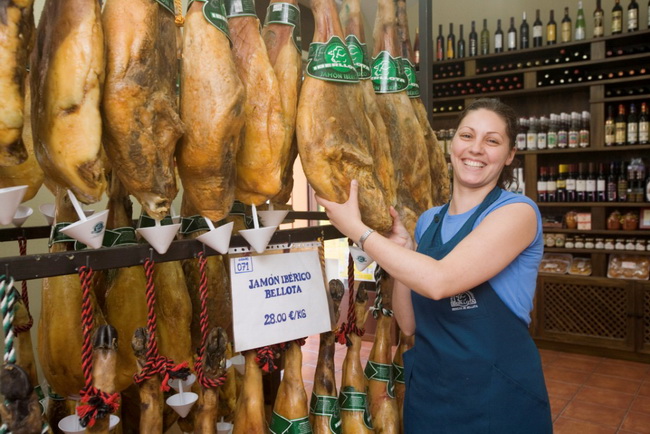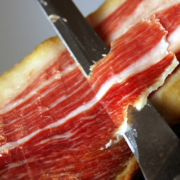Secrets of Spanish Iberian Ham
If there’s one thing you’ll learn for certain as you browse cafes, fine dining establishments and the plates of all the natives around you, it’s that Spaniards are proud of their ham, or jamón iberico. With one taste of this rich specialty, you’ll already know why, but a little background on what makes it so special will further astound you. On our Barcelona Culinary Tours you will be able to taste the famous Joselito, the best Spanish Iberian Ham, but here are some basics facts
about this absolute delicacy.
Instead of being crowded into dirty farms, the pigs that make jamón iberico are raised free range in a forest called a dehesa where there is about one hectare of space for each pig there. These forests, which take up 2 million hectares of land in Spain, is full of ancient oak trees with pastures that have have been kept clear and intact by workers for centuries also. The pigs only graze on fresh acorns, or bellotas, dropping from the trees and the fresh herbs growing around it. So much of their diet is made up of acorns, in fact, that some studies have shown jamón iberico has much more of the healthy kind of fat found in nuts than unhealthy saturated fat. Nutritionist Grande Covián even called the Iberian pig “an olive tree with four legs.”
But the processing of the meat is just as interesting as the way it is raised. When the pig is one year and half old and weighs about 150 kg, it is taken to the butcher . The meat is then covered with marine salt as many days as the kilograms it weighs. Afterwards, they clean the salt and hang the meat 15 days in the drying place, where fresh air circulates freely. Then the ham passes to the cellar, just as good wine does. Here the microflora acts, building a flavorful “bouquet” for the ham. In many cases, the curing process from beginning to end can take as much as four years!
From there, families and restaurateurs across the country take pride in displaying a shoulder or leg of the pig in their kitchens. Among all brands of jamon iberico, it is an accepted fact that the best is Joselito.
Watch for three levels of quality for Iberian ham when you order:
- bellota (free range Iberian pigs acorn only fed)
- recebo (free range Iberian pigs, half fed with acorn, half with animal feed
- cebo (Iberian pigs fattened with animal feed at farms)
Also note that there are four Denominations of Origin:
- Guijuelo (Samalamca)
- Dehesa de Extremadura (Extremadura)
- Huelva (Sierra de Aracena, Jabugo)
- Los Pedroches (Cordoba)
Now you’re ready to head into Spain and feel like a natural among all the other jamón aficionados—enjoy.
Why not have a look at all our Gourmand Breaks Tours to explore which authentic food, wine and cultural experience we can offer you.


